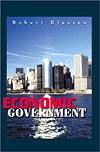Sometimes we can’t see what we’re looking at. For example, I was watching a baseball game on television, and as the camera panned the stadium, the announcer said that paid attendance was forty-two thousand. Nothing remarkable about that, right? Only this time I saw what all of those people were doing — eating, drinking, chatting, pointing, and watching the game — and what they were not doing — fighting, stealing, and tearing each other to pieces. Why? Was there some all-powerful force making those thousands of people behave? No, they were only acting normally.
Television drama portrays misbehavior and violence as normal, yet we don’t experience violence in everyday life. I have driven all over North America, and lived in all kinds of environments, and I’ve never experienced what television portrays as normal. Why? Because people don’t normally behave like that.
Actual normal human behavior has come to be called spontaneous order, the bane of political central planners, and television dramatists, everywhere. One man who studied it in the context of civilization was Spencer Heath, who published his "findings" in 1957. Unfortunately, his book is out of print at the moment, but an excellent summary of his life and work is to be found in these three links.
Heath particularly noted that human civilization advanced as human life-span increased, and populations grew. A subsistence-level desert or jungle tribe with an individual life expectancy of thirty years could barely reproduce itself, and could make little or no improvement in their standard of living, whereas a riparian tribe might discover agriculture, and increase both life-span and lifestyle with improved nutrition.
I doubt if people living eight-thousand years ago understood the changes that more food made in their societies. I doubt if a millet farmer in the ancient Nile delta saw himself at the forefront of a revolution, any more than a Cornish coal miner saw himself in that role two-centuries ago. Indeed, mankind almost invariably attributes human progress to the wrong source; we are somehow unable to see what we’re looking at.
 The Industrial Revolution caught most intellectual interpreters, and all political parasites, by surprise. Here were the little people, the faithful subjects, going about their business of feeding their royal drones, and suddenly machines appeared to do the grueling work of peasants and slaves. As if by magic, new institutions arose in banking, and trade, and the little people nearly got out of the ages-old political trap. Then came Marx, and his tricky trap.
The Industrial Revolution caught most intellectual interpreters, and all political parasites, by surprise. Here were the little people, the faithful subjects, going about their business of feeding their royal drones, and suddenly machines appeared to do the grueling work of peasants and slaves. As if by magic, new institutions arose in banking, and trade, and the little people nearly got out of the ages-old political trap. Then came Marx, and his tricky trap.
 I would argue that mankind still hasn’t come to terms with the Industrial Revolution. We permitted the political plunder of its wonder and wealth from the outset, even while we participated in its propagation, and enjoyed its benefits. We suffered grievously from political usurpation of this power, both in taxes, and in lives, and we still do not see, or acknowledge, where the power originates. Spencer Heath did.
I would argue that mankind still hasn’t come to terms with the Industrial Revolution. We permitted the political plunder of its wonder and wealth from the outset, even while we participated in its propagation, and enjoyed its benefits. We suffered grievously from political usurpation of this power, both in taxes, and in lives, and we still do not see, or acknowledge, where the power originates. Spencer Heath did.
Today we stand on the threshold of another revolution. Human population is growing at an historically unprecedented rate; there have never been so many human persons living on this planet. Meanwhile, individual life expectancy is also growing. In Heath’s terms, mankind has never had this kind of creative and productive potential before, and we should be prepared to see momentous changes.
 What changes? I depart from the doom and gloom crowd here, and I predict the decline and fall of political governments everywhere, not from violence, but from irrelevance. Political boundaries don’t matter anymore. Political fiat money is changing into something else. Political coercion is on the line this minute, and people are rejecting it. We will find better ways of doing things, once we see what we’re looking at.
What changes? I depart from the doom and gloom crowd here, and I predict the decline and fall of political governments everywhere, not from violence, but from irrelevance. Political boundaries don’t matter anymore. Political fiat money is changing into something else. Political coercion is on the line this minute, and people are rejecting it. We will find better ways of doing things, once we see what we’re looking at.




